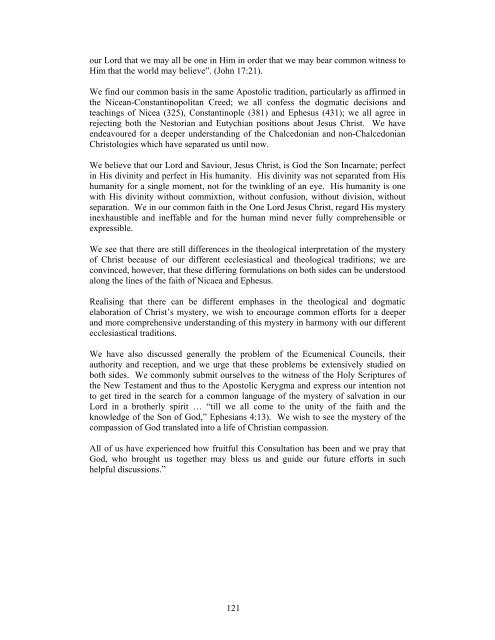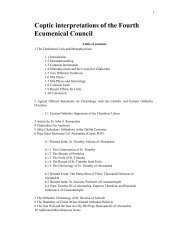Coptic Church & Ecumenical Movement - Saint Mina Coptic ...
Coptic Church & Ecumenical Movement - Saint Mina Coptic ...
Coptic Church & Ecumenical Movement - Saint Mina Coptic ...
You also want an ePaper? Increase the reach of your titles
YUMPU automatically turns print PDFs into web optimized ePapers that Google loves.
our Lord that we may all be one in Him in order that we may bear common witness to<br />
Him that the world may believe”. (John 17:21).<br />
We find our common basis in the same Apostolic tradition, particularly as affirmed in<br />
the Nicean-Constantinopolitan Creed; we all confess the dogmatic decisions and<br />
teachings of Nicea (325), Constantinople (381) and Ephesus (431); we all agree in<br />
rejecting both the Nestorian and Eutychian positions about Jesus Christ. We have<br />
endeavoured for a deeper understanding of the Chalcedonian and non-Chalcedonian<br />
Christologies which have separated us until now.<br />
We believe that our Lord and Saviour, Jesus Christ, is God the Son Incarnate; perfect<br />
in His divinity and perfect in His humanity. His divinity was not separated from His<br />
humanity for a single moment, not for the twinkling of an eye. His humanity is one<br />
with His divinity without commixtion, without confusion, without division, without<br />
separation. We in our common faith in the One Lord Jesus Christ, regard His mystery<br />
inexhaustible and ineffable and for the human mind never fully comprehensible or<br />
expressible.<br />
We see that there are still differences in the theological interpretation of the mystery<br />
of Christ because of our different ecclesiastical and theological traditions; we are<br />
convinced, however, that these differing formulations on both sides can be understood<br />
along the lines of the faith of Nicaea and Ephesus.<br />
Realising that there can be different emphases in the theological and dogmatic<br />
elaboration of Christ’s mystery, we wish to encourage common efforts for a deeper<br />
and more comprehensive understanding of this mystery in harmony with our different<br />
ecclesiastical traditions.<br />
We have also discussed generally the problem of the <strong>Ecumenical</strong> Councils, their<br />
authority and reception, and we urge that these problems be extensively studied on<br />
both sides. We commonly submit ourselves to the witness of the Holy Scriptures of<br />
the New Testament and thus to the Apostolic Kerygma and express our intention not<br />
to get tired in the search for a common language of the mystery of salvation in our<br />
Lord in a brotherly spirit … “till we all come to the unity of the faith and the<br />
knowledge of the Son of God,” Ephesians 4:13). We wish to see the mystery of the<br />
compassion of God translated into a life of Christian compassion.<br />
All of us have experienced how fruitful this Consultation has been and we pray that<br />
God, who brought us together may bless us and guide our future efforts in such<br />
helpful discussions.”<br />
121








